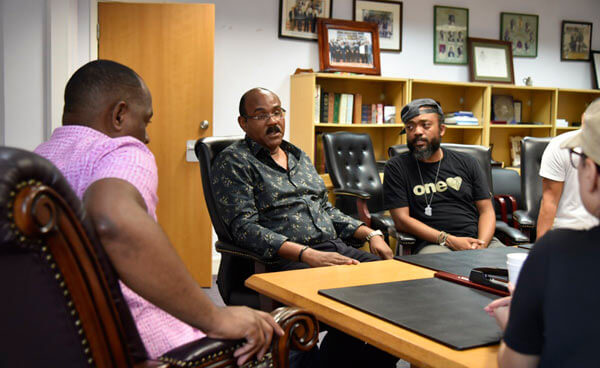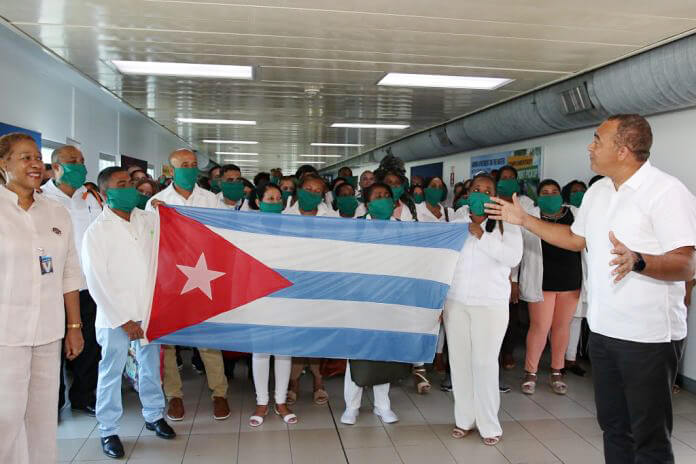Caribbean
The Caribbean Community (CARICOM) has joined the international community in mourning the tragic loss of life wrought by September 19 earthquake in Mexico City.
CARICOM Secretary-General, Ambassador Irwin La Rocque has sent a message of condolence to the government and people of Mexico, expressing his anguish with the widespread destruction and continuing trauma there.
In the message La Rocque said; “this tragedy was unfortunate, especially when Mexico was still recovering from an earthquake of Sept. 7, 2017.”
“The Caribbean Community conveys its heartfelt condolences to the families of those who have lost their lives and to the families missing. The Community also sympathizes with those displaced by the damage caused by the earthquake and hope that critical infrastructure will be restored in swift time,” the message added.
A magnitude 7.1 earthquake killed at least 119 people in Central Mexico.
Bahamas
Bahamas Prime Minister Hubert Minnis has called on Caribbean broadcasters to maintain the highest standards of ethics and security in a changing environment.
Address the recent 48th annual general assembly of the Caribbean Broadcasting Union (CBU), Minnis said the Barbados-based organization has the responsibility to ensure that the highest standard of ethics and security are maintained in the Caribbean broadcast industry.
Minnis said communication is reciprocal process of reaching a mutual understanding, of exchanging information, new, ideas, and shared meanings and goals.
He noted that communication, the heart and soul of broadcasting, is one of the keystones of keeping “our region vibrant and vital in the global arena.”
The prime minister said the best use of broadcast and communication technology must be driven by values and principles that will guide policies and programs.
Minnis said he was pleased that the three-day conference would address issues such as social media guidelines and cyber security for journalists.
Dominica
Officers of the law in Dominica say that looting has been a problem in the aftermath of the monster Hurricane which devastated the Eastern Caribbean islands recently.
There was also a prison break, in which four inmates escaped. Two of them were shot and held by police while the others remain on the run.
Police Chief Daniel Carbon has assured that the crime situation was not out of hand and that police officers had crackdown on offenders.
He said the police force has challenges both as it relates to search and recovery and massive looting but the situation is under control.
Carbon said security personnel from Trinidad and Tobago Defense Force, the Barbados Defense Force, the Royal Antigua and Barbuda Police Force and the Regional Security System have helped get a grip on the situation.
Jamaica
The Jamaican government is moving to train doctors and other stakeholders in dispensing marijuana, as it moves to regulate the industry.
The Ministry of Health said in a statement that to date, 39 physicians, 22 pharmacists, two scientific researchers, and 17 National Council on Drug Abuse staff members have been trained by NeuroPsych Services.
It said training workshops were recently held and the next set of training programs would take place in October.
According to the Ministry to recommend / prescribe medicinal cannabis In Jamaica, registered physicians must be first certified in the use of medicinal cannabis.
The statement said physicians completing the accredited course offered by NeuroPsych Services receive a certification of registration, which will be shared with the Pharmacy Council and pharmacies in Jamaica.
The certificate is renewable every two years.
St. Lucia
St. Lucia has been named as one of the destinations in the Caribbean where a node of the Regional Integration Movement (RIM) will be located.
The Caribbean RIM Platform Initiative (CRIP) for regional cooperation, investment and trade has as one its objectives the establishment of a framework for the stimulation and enhancement of investment and trade relations.
The node located in St. Lucia will serve the entire Organization of Eastern Caribbean States (OECS).
The announcement was made at the recent fourth Trade and Investment Conference and the second RIM conference held at Earth University in Costa Rica.
Chairperson of the grouping and its adviser, Dr. Mark Griffith, also named the other nodes to include Panama, Barbados, as well as Cuba and Haiti. Guyana will serve Guyana and Suriname.
Over the years, Trinidad and Tobago, Barbados and Jamaica have been beneficiaries and promoters of trade and investment between the region and Central America.
St. Kitts
The Eastern Caribbean Central Bank (ECCB) is standing firmly with its member countries that have been impacted by Hurricane Irma.
The bank has so far disbursed a grant of EC$1million each to the governments of Anguilla and Antigua and Barbuda to support relief and early recovery.
A delegation from the ECCB recently visited Anguilla, which included the ECCB Monetary Council member for St. Kitts and Nevis, Prime Minister Dr. Timothy Harris and Governor Timothy Antoine.
They met with Chief Minister of Anguilla, Victor Banks and other senior government officials to tour the country and get a first-hand account of the impact of Hurricane Irma.
Antoine, accompanied by Council Member for Antigua and Barbuda, Prime Minister Gaston Browne visited Barbuda.
The governor and his team also visited the three shelters on Antigua established for the displaced residents from Barbuda and delivered supplies as words of encouragement.
Trinidad
Prime Minister Dr. Keith Rowley has revealed that between 2014 and this year, Trinidad and Tobago suffered a massive drop of 90 percent in oil revenue, plummeting from a high of TT$19.4 billion in 2014 to a meagre $2.1 billion this year.
Rowley gave overview of the country’s state of the economy a few days before the 2017 / 2018 Budget presentation by the Minister of Finance in Parliament (Oct. 2, 2017).
He was at the time speaking at a pre-budget presentation at the Hyatt Regency Hotel in Port of Spain, Trinidad on Wednesday.
Rowley said despite the massive shortfall in revenue, which has placed the country in an economically precarious position, Trinidad and Tobago will not return to the days of foreign exchange controls but will also not maintain an exchange rate at levels which will further encourage imports.
He said his government will not use the limited foreign exchange reserves to support the exchange rate.
This, he said, would be paving the way into the arms of the International Monetary Fund (IMF), adding, “this is something this government is not prepared to do.”
-Compiled by Azad Ali


























